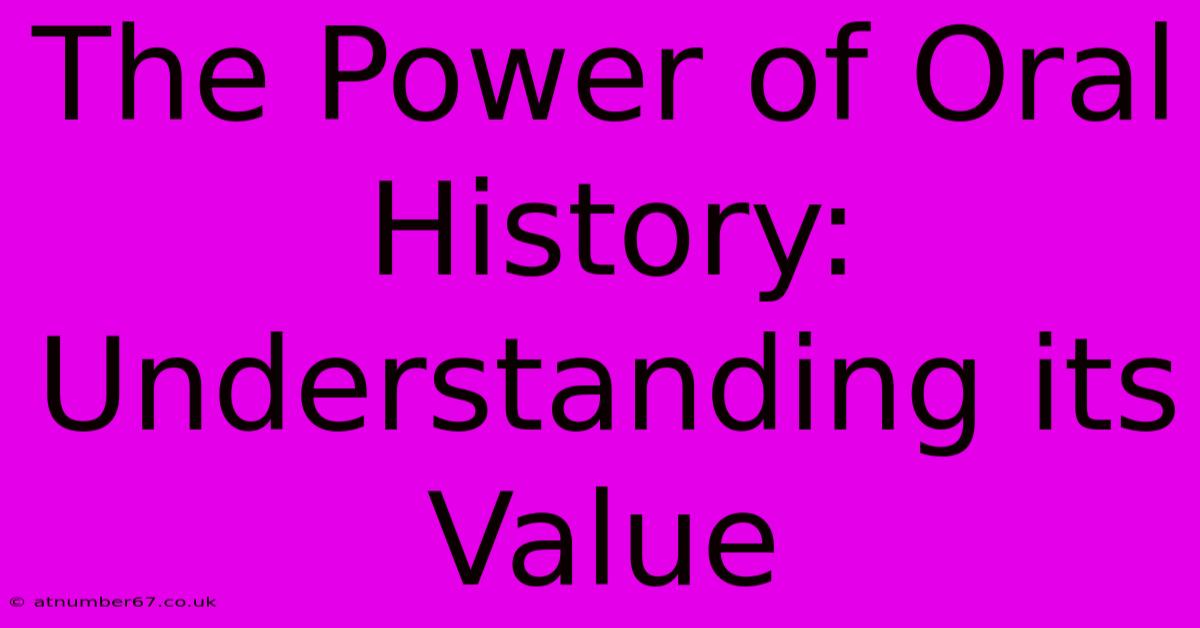The Power Of Oral History: Understanding Its Value

Table of Contents
The Power of Oral History: Understanding its Value
Oral history, the collection and study of individual memories and experiences, offers a powerful lens through which we can understand the past. More than just anecdotes, oral histories provide invaluable insights into the lives of ordinary people, filling gaps left by traditional historical sources and enriching our understanding of the human experience. This article explores the significant value of oral history and its impact on various fields.
Why Oral History Matters: Beyond the Written Record
Traditional historical accounts often focus on the perspectives of the powerful, neglecting the voices and experiences of marginalized communities. Oral history corrects this imbalance, giving a voice to those who have been historically silenced. It allows us to hear firsthand accounts of significant events, understand social changes from the ground up, and appreciate the diversity of human experience.
Filling the Gaps in Traditional History
Written records frequently leave out crucial details or offer a biased perspective. Oral histories can supplement these records, providing a more complete and nuanced picture of the past. For example, studying personal narratives of individuals who lived through a war can shed light on its human cost, far beyond official battle statistics.
Preserving Cultural Heritage and Traditions
Oral history plays a crucial role in preserving cultural heritage. It captures customs, traditions, and beliefs that might otherwise be lost, offering insights into the evolution of societies and cultures. The stories of elders hold invaluable knowledge, including traditional practices, languages, and storytelling techniques. These are often not documented in written form.
The Value of Oral History Across Disciplines
The applications of oral history extend far beyond academia. Its value is recognized in various fields:
History and Social Sciences:
Oral history enriches historical research, providing rich primary source material for understanding past events and social movements. It allows historians to explore the lived experiences of individuals within specific historical contexts.
Anthropology and Cultural Studies:
Anthropologists and cultural studies scholars utilize oral histories to explore cultural practices, beliefs, and values. It enables the documentation and preservation of diverse cultural traditions and the understanding of their evolution.
Family History and Genealogy:
For many individuals, oral history is a key tool for exploring family history and building a deeper understanding of their ancestry. It helps reconnect with family stories, traditions, and personal narratives.
Community Building and Social Justice:
Oral history projects can also serve as powerful tools for community building and social justice. By giving voice to marginalized communities, they can contribute to social change and promote understanding and empathy.
Conducting Ethical Oral History: Best Practices
The ethical considerations involved in conducting oral history research are paramount. Respect for the interviewee is crucial, and it’s vital to:
- Obtain informed consent: Ensure participants understand the purpose of the interview, how the information will be used, and their rights to privacy and anonymity.
- Maintain confidentiality: Protect the identity and sensitive information of participants.
- Ensure accuracy and transparency: Preserve the integrity of the recorded narratives.
- Give back to the community: Share the results of the research with the community involved and consider ways to ensure the preservation of oral histories collected.
Conclusion: The Enduring Power of Voice
Oral history offers an invaluable means of understanding the past, celebrating diversity, and fostering social justice. By preserving individual memories and experiences, we enrich our understanding of the human story and ensure that the voices of the past continue to resonate in the present and future. The power of oral history lies not just in the stories themselves, but in the enduring power of the human voice to connect us across time and cultures.

Thank you for visiting our website wich cover about The Power Of Oral History: Understanding Its Value. We hope the information provided has been useful to you. Feel free to contact us if you have any questions or need further assistance. See you next time and dont miss to bookmark.
Featured Posts
-
Que Son Los Metodos Anticonceptivos Choosing The Right Method
Apr 14, 2025
-
The Surprising Passions Of Tom Hanks Son
Apr 14, 2025
-
Unveiling The Mystery Madiha Shahs Daughter
Apr 14, 2025
-
Victory Over Cancer Gary Sinises Sons Triumph
Apr 14, 2025
-
Bryan Johnsons Net Worth How He Gives Back
Apr 14, 2025
